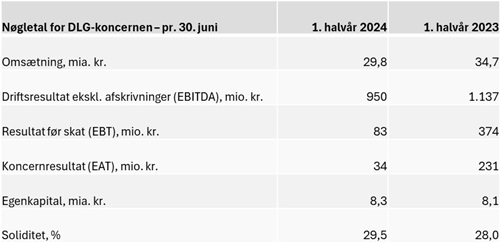DLG delivers solid interim results
With an operating profit (EBITDA) of DKK 950 million, the DLG Group maintains a high level of earnings for the first six months of 2024. Group CEO Kristian Hundebøll describes the interim results as satisfactory given current market conditions.
Despite the challenging market conditions, DLG Group has further consolidated its business in the first six months of the year and delivered solid H1 results.
“I’m pleased that despite the challenging market, we’re in a strong position due to our strategic focus on improving our financial resilience over a number of years. The interim results are in line with the budgeted expectations. Our Food activities delivered their best interim results (EBITDA) to date, while we are seeing a decline in earnings in our German energy and building materials business, which is due to the slowdown in the German economy,” says DLG Group CEO Kristian Hundebøll.
Revenue for the first six months of 2024 totalled DKK 30 billion compared to DKK 34.7 billion in the prior-year period, a decrease that should be seen in light of lower consumption and a significant decrease in the general price levels for grain, raw materials and energy compared to 2023. Against a backdrop of rising interest rates and higher costs, the profit before tax (EBT) was DKK 83 million for H1 2024 compared to DKK 374 million in 2023, which was the Group’s best half-year profit to date because of extraordinarily favourable market conditions.
“Our fixed costs have been increasing, partly due to the high rate of inflation in Germany, while interest expenses have increased markedly. There is no prospect of interest rates changing significantly in the near future, and we are therefore continuing our efforts to adjust costs and increase our earnings capacity,” says Kristian Hundebøll.
Record half-year for Food division
Positive results for the first half of the year were delivered across the board from the Group’s agricultural and food-related activities. As a result, EBITDA increased to DKK 582 million compared to DKK 551 million in the prior-year period. A stabilised market for animal nutrition is making a positive contribution, and the German agricultural activities and the vitamin and mineral business Vilofoss are also delivering satisfactory growth after a challenging period. In addition, the egg and poultry activities continue to deliver good results.
“Our agricultural and food-related businesses constitute a strong backbone for the Group and have got off to a good start this year. In recent years, we have focused a lot on stabilising our German business, and we’re now seeing the effects of this, while Vilofoss is also posting solid progress,” says Kristian Hundebøll.
After the halt to Russian gas imports in 2022 caused the German energy market to overheat and resulted in two years of extraordinary demand and high prices, the market has now fallen back to a more normalised level. This is due to a combination of factors, such as increased price awareness. Also, demand is lower due to the slowdown in the German economy, which is causing a decline in energy consumption. This is reflected in the operating profit of the Energy business area, which in the first six months of the year realised an EBITDA of DKK 261 million against DKK 424 million in the prior-year period.
The economic slowdown in Germany and especially the higher interest rates are also impacting the construction industry, where activity levels fell during the first six months of the year. This is reflected in sales of building materials, where demand has been declining, resulting in lower sales and lower profit margins. The Housing business area posted an EBITDA of DKK 107 million compared to DKK 163 million in the prior-year period.
“In recent years, our German building materials business has delivered impressive growth rates, but right now we’re seeing a slowdown in the market combined with a reluctance to invest. However, construction and renovation are still badly needed in Germany, and we still expect the desire to invest to return and the demand for building materials to increase again. We are one of the biggest suppliers of building materials and enjoy a strong market position. This means that we can take advantage of the opportunities that come our way when activity levels increase again,” says Kristian Hundebøll.
Focus on the future
Contributing to the sustainable transition is a key element of the DLG Group strategy, Creating the Future 2030. In recent years the Group has therefore invested significantly in companies and technology that can contribute to realising this strategy.
In 2024, the Group has established a strategic partnership with Novo Holdings to promote sustainable agricultural and food production. In the first phase, Novo Holdings acquires 25% of the shares in Sejet Planteforædling (Sejet), which is wholly owned by the DLG Group and a leader in agricultural innovation.
In addition, the DLG Group, in partnership with Argentina’s largest agricultural company ACA, has made a major investment in the Argentine soybean mill Entre Ríos Crushing S.A. (ERCSA), which will secure annual imports of up to 200,000 tonnes of deforestation-free and segregated soy for the north European market.
“We’ve taken some important and necessary steps with investments that will support the green transition and help to ensure that we can deliver tomorrow’s solutions to our customers. Now, we are slowing our pace of investment slightly and focusing on strengthening the investments we have already made,” says Kristian Hundebøll.
Outlook for FY 2024
“We expect the trends we’ve seen in the first half of the year to continue into the second half, and the state of the market in Germany will continue to affect the group's earnings. The geopolitical situation and the world economy may have a bearing on market developments. However, we maintain our outlook of an EBITDA of approx. DKK 2.4 billion for the full year and stable financial key figures,” says Kristian Hundebøll.

